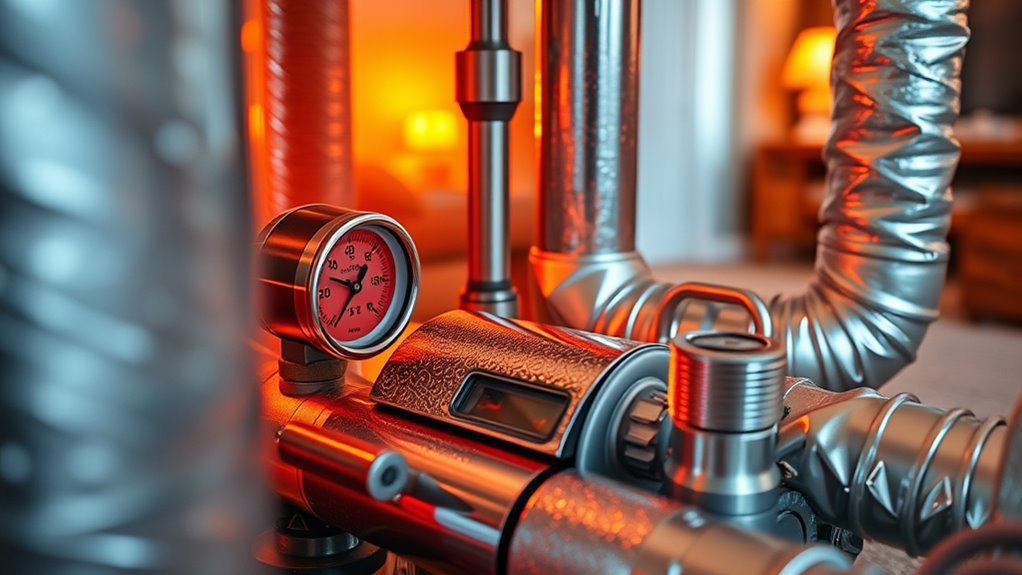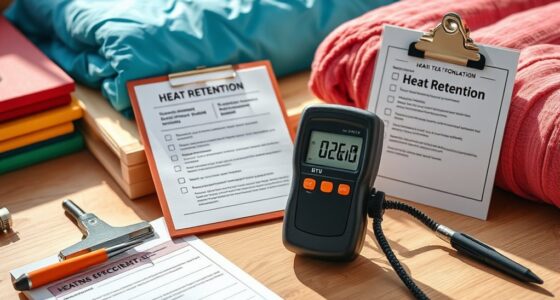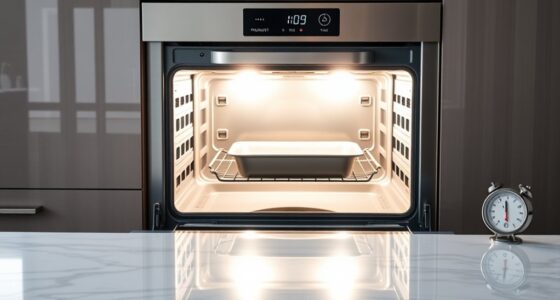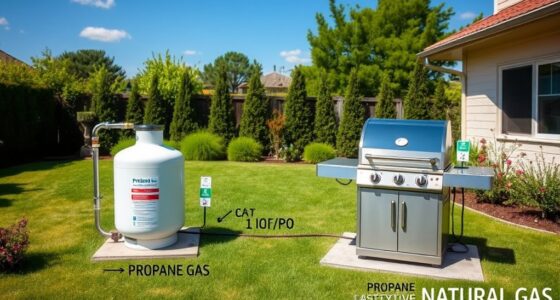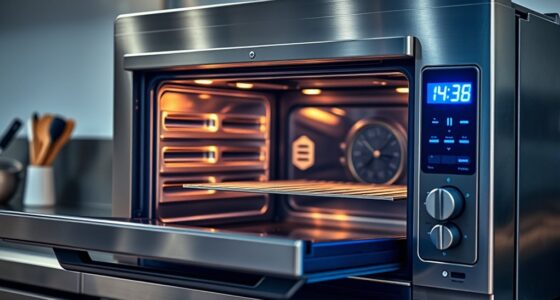Understanding BTU ratings and heat retention helps you choose the right size system and improve safety. Too high or too low BTUs can cause energy waste, discomfort, or safety risks like system failure or fire hazards. Proper insulation boosts heat retention, making your heating more efficient and safer. If you want to avoid common mistakes and keep your home warm and secure, there’s more to uncover about optimizing your heating system safely.
Key Takeaways
- Properly sizing BTU units ensures safety, prevents overheating, and avoids energy waste or insufficient heating.
- Adequate insulation and sealing improve heat retention, reducing system strain and safety risks from excess heat buildup.
- Regular system maintenance and professional inspections prevent issues like pressure imbalances and electrical hazards.
- Oversized or undersized systems increase fire hazards, moisture problems, or equipment failure—correct sizing is crucial.
- Understanding heat transfer and insulation enhances system safety, efficiency, and longevity through better heat retention practices.
Understanding How BTU Ratings Impact Home Heating

Understanding how BTU ratings impact home heating is essential for choosing the right heating system. A higher BTU rating means more heat output, which can quickly warm large spaces but may waste energy if your home doesn’t need that much heat. To optimize energy conservation, focus on insulation upgrades first, as better insulation helps retain heat and reduces the demand on your heating system. Proper insulation keeps warmth inside, meaning you won’t need to rely on a high BTU heater that could lead to unnecessary energy use. Conversely, an underpowered unit won’t adequately heat your space, causing frustration and higher energy costs. Additionally, selecting the appropriate Volkswagen Tuning modifications can improve the efficiency of your vehicle’s heating system, similar to optimizing home insulation. By balancing your BTU needs with effective insulation, you ensure efficient, comfortable heating without wasting energy.
The Importance of Properly Calculating Your Heating Needs

Calculating your heating needs accurately is essential to guarantee your home stays comfortable without wasting energy. Proper calculations help you avoid under- or over-heating, saving money and improving efficiency. Here’s what to contemplate:
Accurate heating calculations ensure comfort, efficiency, and energy savings in your home.
- Assess your home’s insulation upgrades to determine how much heat is retained.
- Ensure thermostat calibration is precise for consistent temperature control.
- Calculate the square footage of your space to match your heating system’s capacity.
- Factor in local climate conditions to adjust your BTU requirements accordingly.
- Consider performance upgrades such as improved insulation or HVAC components to optimize heat retention and system efficiency.
How Heat Retention Affects Overall Efficiency
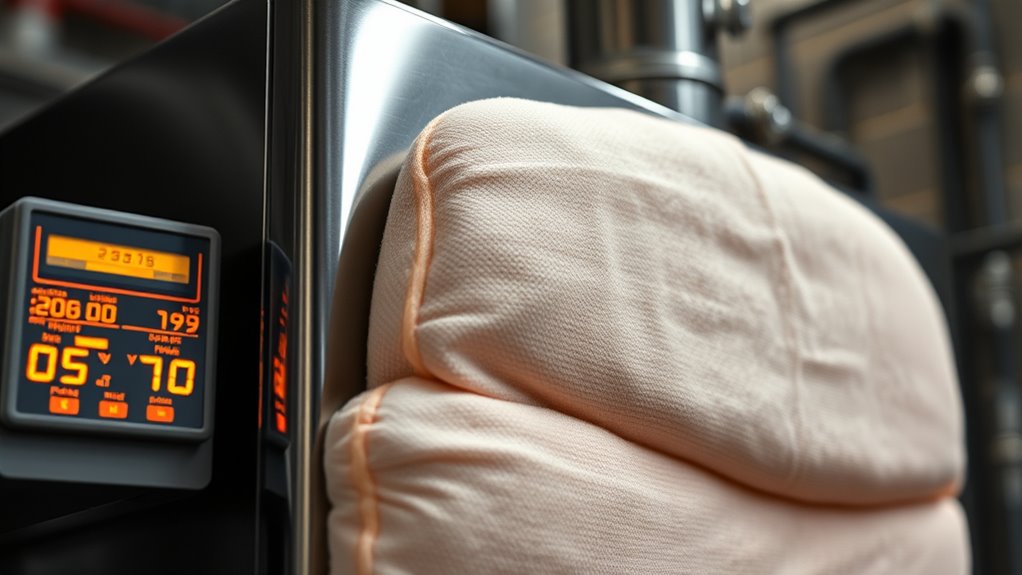
Since heat retention directly impacts how efficiently your heating system works, it’s essential to contemplate how well your home holds onto warmth. Proper thermal insulation minimizes heat loss, keeping warmth inside longer. Ventilation efficiency ensures fresh air circulation without letting heat escape unnecessarily. Poor insulation or excessive ventilation can cause your system to work harder, increasing energy use and costs. Improving these areas helps maintain consistent indoor temperatures, reducing BTU requirements. Consider sealing leaks and adding insulation in key areas. Additionally, understanding heat transfer mechanisms enables homeowners to implement more effective insulation strategies.
Common Mistakes That Lead to Over- or Under-Heating

Many homeowners make simple mistakes that cause their heating systems to over- or under-heat their homes. These errors often stem from neglecting proper maintenance or DIY repair. First, skipping thermostat calibration can lead to inaccurate temperature control. Second, setting the thermostat too high or low causes unnecessary energy use and uneven heating. Third, ignoring regular filter changes restricts airflow, impacting heat distribution. Fourth, attempting DIY repair without proper knowledge can worsen issues or damage components. To avoid these mistakes, regularly calibrate your thermostat, keep filters clean, and don’t hesitate to seek professional help when needed. Proper system tuning ensures consistent comfort and prevents wasting energy. Additionally, understanding Gold IRA Rollovers can be vital for long-term retirement planning, helping you diversify and safeguard your assets. Small adjustments now can save you from costly repairs and discomfort later.
Safety Hazards Associated With Incorrect BTU Sizing
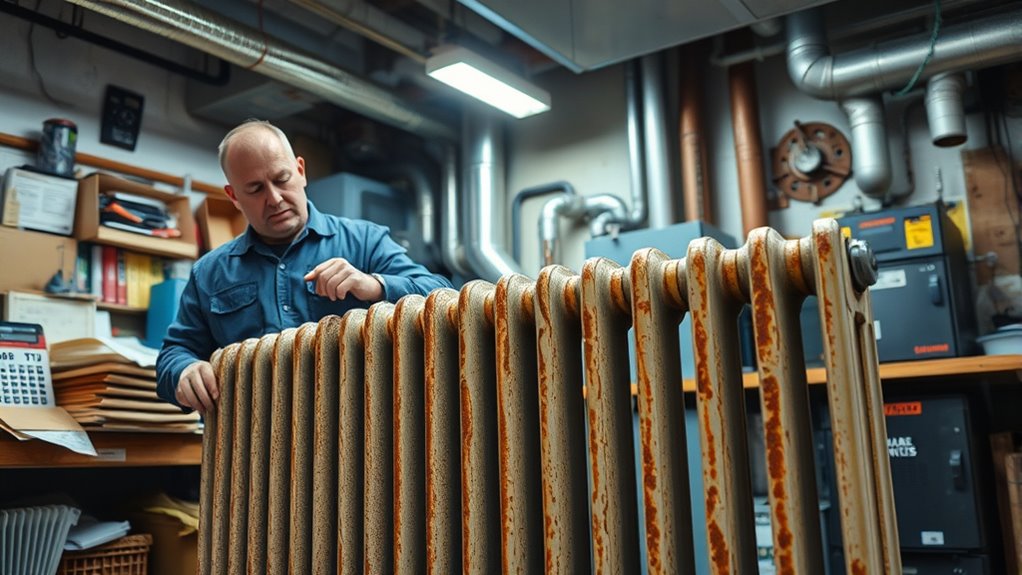
Using an incorrectly sized BTU system can pose serious safety risks in your home. If your system is too powerful, it may cycle on and off rapidly, causing wear and increasing fire hazards. Conversely, a system that’s too small struggles to heat efficiently, leading to moisture buildup and ventilation concerns that could promote mold or other issues. Overly large units can produce excess heat, damaging walls or electrical wiring. Inadequately sized systems also risk creating unsafe pressure levels. Proper system sizing is essential to maintain safety and efficiency.
Tips for Improving Heat Retention in Your Home
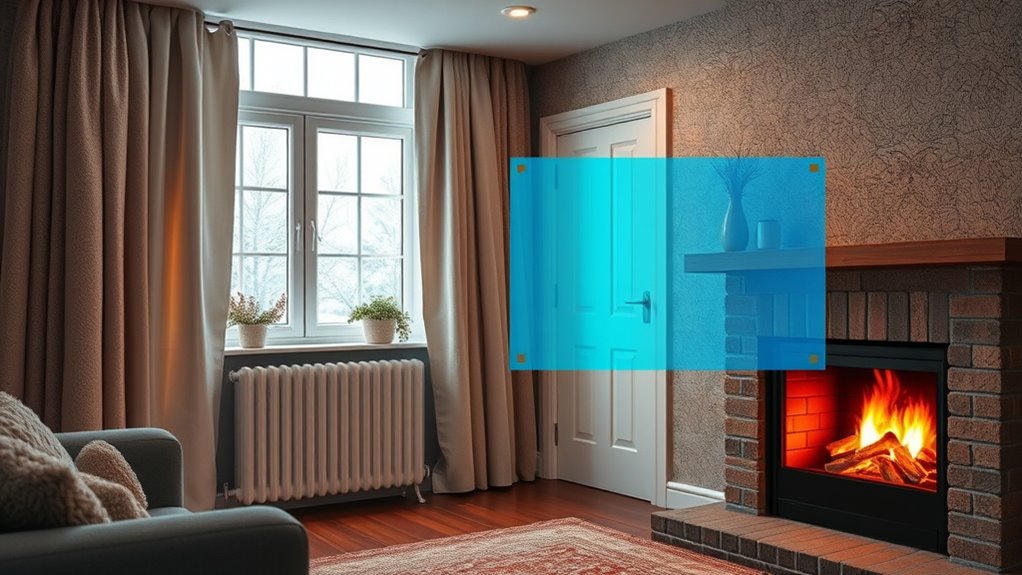
Improving heat retention in your home can substantially reduce energy costs and enhance comfort during cold months. Start by prioritizing insulation upgrades, especially in the attic and walls, to keep warm air inside. Next, focus on draft prevention by sealing gaps around windows, doors, and vents, which can leak heat. Consider installing weather stripping or draft stoppers to block cold air infiltration. Additionally, use heavy curtains or thermal drapes at night to retain heat in living spaces. Finally, insulate your floors and basement areas to prevent heat loss downward. These simple steps can make a big difference and ensure your home stays warmer longer, reducing your reliance on your heating system and lowering your energy bills. Improving heat retention also involves understanding how heat transfer mechanisms like conduction, convection, and radiation affect your home’s warmth.
When to Consult Professionals for Heating System Assessments

If your heating bills are unexpectedly high or your system struggles to keep your home warm, it’s time to consult a professional. They can spot inefficiencies and safety hazards that may go unnoticed. Regular assessments also guarantee your system is properly maintained, keeping it running efficiently. Additionally, understanding inverter generator features can help you choose reliable backup power options during outages.
Recognizing System Inefficiencies
Recognizing when your heating system isn’t working efficiently is crucial to maintaining a warm and comfortable home. If you notice signs like uneven heating, higher energy bills, or frequent system cycling, it’s time to seek professional help. Consider these key indicators:
- Your home feels drafty despite existing insulation upgrades.
- Rooms heat unevenly, with some areas remaining cold.
- Venting issues cause strange noises or inconsistent airflow.
- Your system runs constantly without reaching desired temperatures.
- Insulation deficiencies can also contribute to heat loss and reduced system efficiency.
These signs suggest your system may have venting issues or insulation deficiencies. Addressing these problems early can improve heat retention and energy efficiency. A professional assessment can identify underlying issues and recommend proper solutions, ensuring your heating system operates effectively.
Identifying Safety Hazards
While addressing system inefficiencies can improve comfort and save energy, safety hazards require immediate professional attention. Recognize signs like unusual smells, persistent sparks, or flickering lights, which could indicate fire hazards or electrical safety issues. Keep an eye out for exposed wiring, burnt odors, or overheating components—these are clear signals that a heating system needs expert inspection. If your system makes strange noises or if there’s visible damage, don’t attempt repairs yourself; instead, contact a qualified technician. Ignoring these dangers can lead to fires or electrical failures, risking your safety and property. Additionally, understanding heat retention principles can help prevent issues caused by poorly maintained systems. When in doubt, always consult professionals to evaluate your heating system. Their expertise guarantees hazards are properly identified and addressed, keeping your home safe.
Ensuring Proper Maintenance
Regular maintenance is essential to keep your heating system running efficiently and safely. Recognize when professional help is needed to prevent issues like ventilation problems or thermostat calibration errors from worsening. Consider consulting a professional if:
- You notice inconsistent heating or cold spots in your home.
- Your system makes strange noises or emits strange smells.
- Ventilation issues cause poor air quality or moisture buildup.
- The thermostat displays inconsistent temperatures despite calibration attempts.
- Comfort solutions for system failure can help identify underlying problems before they escalate.
Professionals can assess your system’s overall condition, guarantee proper ventilation, and fine-tune your thermostat for maximum performance. Regular inspections can prevent costly breakdowns and improve heat retention, keeping your home warm and safe. Don’t hesitate to seek expert help when you’re unsure about system performance or safety concerns.
Frequently Asked Questions
How Does Insulation Quality Influence BTU Needs?
You’ll find that higher-quality insulation types substantially reduce your BTU needs by improving energy efficiency. When you choose better insulation, it minimizes heat loss in winter and keeps heat out in summer, so your heating and cooling systems don’t have to work as hard. This means you’ll use less energy, save money, and enjoy a more comfortable home. Upgrading insulation is a smart move for better heat retention and lower utility bills.
Can Improper Heat Retention Cause Structural Damage?
Improper heat retention can cause structural damage by leading to thermal bridging and moisture intrusion. When insulation isn’t effective, heat escapes, creating cold spots that promote condensation. This moisture can seep into walls, weakening materials and fostering mold growth. Over time, the combined effects of thermal bridging and moisture intrusion compromise your building’s integrity, risking costly repairs and safety hazards. Ensuring proper insulation helps prevent these issues and protects your structure.
What Safety Risks Exist With Oversized Heating Units?
Oversized heating units can pose serious safety risks, like overheating hazards that may lead to fires. When a unit is too powerful, it struggles to regulate temperature, increasing the chance of overheating components or surrounding materials. This not only risks fire but also damages your system and structure. Always guarantee your heater matches your space’s needs to prevent these dangers, and never ignore signs of excessive heat or malfunction.
How Often Should Heating Systems Be Professionally Evaluated?
Think of your heating system as a garden that needs regular tending. You should schedule professional HVAC maintenance at least once a year to keep it thriving. Regular evaluations act like a health check-up, ensuring energy efficiency and preventing costly breakdowns. By staying proactive, you preserve warmth and comfort, much like nurturing a garden to bloom beautifully, saving money and energy in the long run.
Are There Health Concerns Related to Incorrect Heating Temperatures?
Incorrect heating temperatures can pose health concerns, impacting your temperature regulation and overall well-being. If your system runs too hot, you risk dehydration, heat exhaustion, or burns, especially for vulnerable individuals. Conversely, too cold temperatures can lead to hypothermia and respiratory issues. Maintaining proper temperature regulation is essential to prevent these health implications. Regularly checking and adjusting your heating system ensures a safe, comfortable environment that supports your health.
Conclusion
Think of your home as a cozy boat on a vast ocean. If your heater’s size is off, it’s like having too much or too little ballast—either rocking wildly or drifting cold. By understanding BTUs and heat retention, you’re steering wisely, keeping your home steady and warm. When unsure, call in the pros to help navigate these waters. With the right setup, your home becomes a peaceful ship, sailing smoothly through every season.
